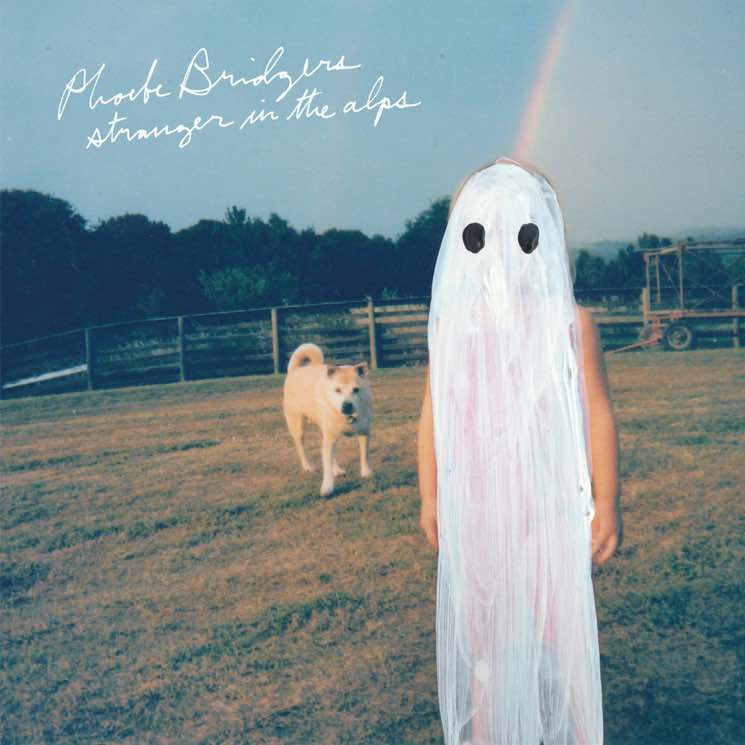The gripping tension between vulnerability and courage on Los Angeles musician Phoebe Bridgers' debut album, Stranger in the Alps, is something that usually takes singer-songwriters numerous attempts to achieve — if ever.
Opening song "Smoke Signals" starts out with weary, eloquent guitar and Bridgers' quiet, arresting voice gently exposing cracks in her haunting memories. She's mourning for lost friends, heroes, feelings and homes, and acceptance becomes a way for her to cope with the void. Halfway through, sparse patches of strings slightly fill the songs' burning sentiment with these strands of hope. Bridgers' obsession with understanding sadness allows Stranger in the Alps to distil the emotion so that every line sticks, and is relatable in some way.
On "Funeral," Bridgers deals with the harsh confusion and permanence of a sudden death, and the inability to process grief. The 22-year old is impressively strong at conveying intimacy; when she whispers, "wishing I was someone else, feeling sorry for myself and I remembered someone's kid is dead," it's strikingly heavy, tangible and real.
As harrowing as parts of Stranger in the Alps is, Bridgers shifts into more optimistic arrangements on the alt-country radiance of "Motion Sickness," and on the melancholy duet with Conor Oberst, "Would You Rather." The album's narrative of anecdotal self-evaluation and remedial surrender never wavers though, and is impressive considering that many of the songs were written across several years.
"Killer," originally produced by Ryan Adams in 2015, is re-recorded here as a stunning piano ballad and feels comfortable in its yielding maturity. The similarly re-done "Georgia," written by Bridgers when she was in high-school about heartbreak, adds buzzing electric guitar to accompany Bridgers' most precious and memorable vocal melody on the album.
Stranger in the Alps is a gorgeously written record, and Bridgers shows her brilliance consistently across its 45-minute runtime. After touring with the likeminded Julien Baker and veteran Oberst, Bridgers is sure to follow in their footsteps, with a promising future ahead of her.
(Dead Oceans)Opening song "Smoke Signals" starts out with weary, eloquent guitar and Bridgers' quiet, arresting voice gently exposing cracks in her haunting memories. She's mourning for lost friends, heroes, feelings and homes, and acceptance becomes a way for her to cope with the void. Halfway through, sparse patches of strings slightly fill the songs' burning sentiment with these strands of hope. Bridgers' obsession with understanding sadness allows Stranger in the Alps to distil the emotion so that every line sticks, and is relatable in some way.
On "Funeral," Bridgers deals with the harsh confusion and permanence of a sudden death, and the inability to process grief. The 22-year old is impressively strong at conveying intimacy; when she whispers, "wishing I was someone else, feeling sorry for myself and I remembered someone's kid is dead," it's strikingly heavy, tangible and real.
As harrowing as parts of Stranger in the Alps is, Bridgers shifts into more optimistic arrangements on the alt-country radiance of "Motion Sickness," and on the melancholy duet with Conor Oberst, "Would You Rather." The album's narrative of anecdotal self-evaluation and remedial surrender never wavers though, and is impressive considering that many of the songs were written across several years.
"Killer," originally produced by Ryan Adams in 2015, is re-recorded here as a stunning piano ballad and feels comfortable in its yielding maturity. The similarly re-done "Georgia," written by Bridgers when she was in high-school about heartbreak, adds buzzing electric guitar to accompany Bridgers' most precious and memorable vocal melody on the album.
Stranger in the Alps is a gorgeously written record, and Bridgers shows her brilliance consistently across its 45-minute runtime. After touring with the likeminded Julien Baker and veteran Oberst, Bridgers is sure to follow in their footsteps, with a promising future ahead of her.
